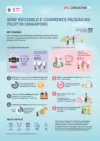The Future is Looking Bright for Reusable E-Commerce Packaging
The future is sustainable – and to achieve this, sustainability must start today. Taking another step in this direction is DHL Consulting and WWF-Singapore. They got together to conduct a reusable packaging pilot project for e-commerce – and the findings may surprise you.
The concept of reusable e-commerce packaging
As the name suggests, reusable packaging is packaging that can be used over and over again. Unlike single-use, disposable packaging such as cardboard boxes, reusable packaging is usually made of a durable material.
An important question arises, though: Is this kind of e-commerce packaging even feasible and viable? DHL Consulting and WWF-Singapore came together to find out.
Pilot project for the use of reusable e-commerce packaging
In the e-commerce supply chain, 45% of carbon emissions come from packaging alone. With rising growth in the e-commerce market, there is huge potential here for more sustainability – moving toward a resource-friendlier circular economy.
To test this potential of reusable packaging, a total of 12 retailers selling products in different categories – ranging from personal care to clothing to pet products – and operating at different scale were part of a six-month pilot project in 2022.
Several factors were taken into account for a comprehensive insight – such as product protection, packaging quality, and labeling – which are explained in more detail in the “Reusable E-Commerce Packaging Pilot” report.
The report also has some fascinating findings in store …
Promising results with great potential for global sustainability change
Of course, the aim of the pilot project for reusable e-commerce packaging is to gain useful insights and findings into how a returns system could work and be successful. This aim was fully achieved.
Sustainability was shown to be an important issue indeed, with an opt-in rate for reusable packaging reaching up to 62%. Many consumers are even willing to pay a bit more for the use of reusable packaging as a way to act more sustainably.
When it came to returning the packaging, one in two consumers who opted for the reusable packaging returned it. Considering this was a pilot project and a completely new concept, the return rate is incredibly promising. The pilot showed that with clear communication, instructions and reminders, the return rate can increase to up to 83%.
Incentives and convenience for both opting in and returning the packaging also play a significant role in boosting the feasibility of reusable e-commerce packaging, as detailed in the “Reusable E-Commerce Packaging Pilot” report.
The Impact of the DHL Consulting and WWF-Singapore Collaboration
Both DHL Consulting and WWF-Singapore harnessed their individual expertise to realize this comprehensive pilot project. DHL Consulting contributed analyses, findings, and recommendations, among others – while WWF-Singapore, the world’s largest and most well-renowned conservation organization, leveraged the competence of its Plastic ACTion business initiative to provide guidance.
With the tightening of regulations for Europe by the European Commission, the results of this collaboration are more significant than ever. Consulting and guidance based on research and expert analysis can take this reusable packaging initiative from Singapore to the world. Whether for small and medium-sized enterprises or global players with complex structures. The receptiveness toward sustainable packaging is there, and now it’s time to go further with it into a bright future.
Check out the details of the pilot and findings in the “Reusable E-Commerce Packaging Pilot” report.




